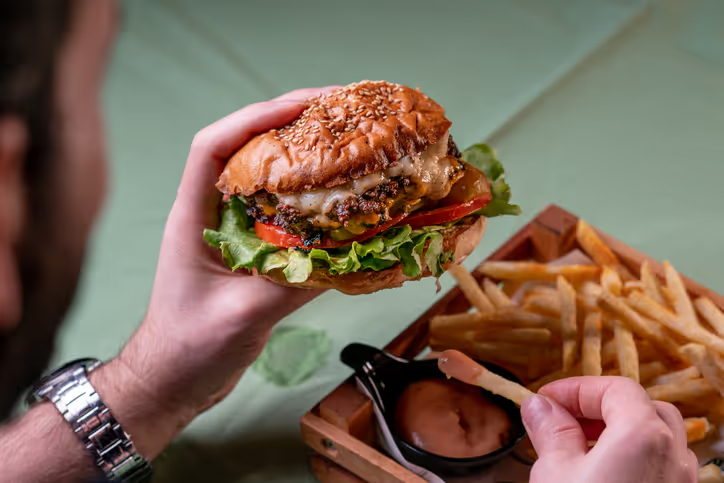Mounjaro® is growing in popularity as an effective medication to gradually treat high blood sugar levels in people with type 2 diabetes. However, some of the side effects of the medication can be exacerbated by the foods we eat. People often aren't sure what foods to avoid and what foods to eat if they take Mounjaro. This article will explain what types of food are best to avoid when taking Mounjaro and what to eat to help lessen side effects and feel your best.
The role of diet in Mounjaro treatment
Mounjaro (generic name tirzepatide) is an injectable prescription medicine that is used along with diet and exercise to improve blood sugar (glucose) in adults with type 2 diabetes mellitus. In studies of people taking Mounjaro with or without other diabetes medication, improvement in A1C was shown. The A1C test—also known as the hemoglobin A1C or HbA1c test— is a blood test that measures average blood sugar levels over the past 3 months. It's a commonly used test to diagnose pre-diabetes and diabetes, and is also the main test to help a healthcare provider manage diabetes. Mounjaro is a GIP/GLP-1 receptor agonist that stimulates insulin release in response to high blood glucose levels. By stimulating the release of hormones such as insulin and glucagon, it helps to reduce hunger, decrease food intake, and promote feelings of fullness. The FDA has not yet approved Mounjaro for obesity, but that is likely to change in the near future based on how effective this drug has been for decreasing body weight in clinical trials.
While there are many beneficial effects of Mounjaro, like any medication, there are some potential side effects that need to be taken into consideration. Some of these side effects are adverse, especially when just starting the medication, and can be exacerbated by eating certain foods. The most common side effects of Mounjaro are:
- nausea
- vomiting
- diarrhea
- constipation
- heartburn
- abdominal pain
- gas
- bloating
- suppressed appetite
- headaches, shortness of breath, dizziness, and an increase in heart rate can occur as well, though less commonly.
- gallbladder disease is another potential side effect, and other rare side effects can also occur.
There are no foods that are strictly off-limits for people who take Mounjaro. However, some foods, especially high fat, fried, or greasy foods may exacerbate adverse side effects, such as worsening nausea, diarrhea, or vomiting. Eating sugary foods can make it more difficult to manage blood sugars and increase insulin resistance thereby lowering the effectiveness of the medication. One of the benefits of Mounjaro is that it supports healthy blood sugars when it's combined with a healthy diet and physical activity. Avoiding or limiting certain foods may be helpful to both avoid adverse side effects and boost the efficacy of the medication. It's always a good idea to talk with your healthcare provider before making dietary changes.
Foods to avoid on Mounjaro
Although no foods are completely off-limits while taking Mounjaro, certain types of food can exacerbate some of its side effects, hinder blood sugar control, or increase the possibility of weight gain. Symptoms and severity of symptoms vary from person to person. Be sure to discuss symptoms with your medical team. To optimize your treatment outcomes, you may want to consider avoiding or limiting the following foods:
- Fried and greasy foods: Consuming fried foods can produce gastrointestinal symptoms that resemble some of Mounjaro's side effects, such as bloating and stomach pain. Additionally, high-fat foods tend to be high in calories and saturated fats that can deter weight loss efforts when consumed in large amounts. Consuming these foods can also increase your chance of developing high blood pressure, chronic inflammation, and insulin resistance.
- Sugary foods: Foods with high sugar content such as candy, soda, desserts, ice cream, specialty coffee drinks, and juices can cause blood sugar spikes that counteract Mounjaro's blood sugar-lowering effects. Moreover, they often contribute to weight gain and insulin resistance as they lack nutritional value, which can make it more challenging to attain your desired weight.
- Carbonated beverages: Drinking sodas or other carbonated beverages can lead to bloating, burping and abdominal discomfort that can worsen some of Mounjaro's side effects.
- Refined carbohydrates: Foods that contain refined carbohydrates, such as white bread, pasta, and processed snacks, can raise blood sugar levels and undermine your weight loss efforts.
- Alcohol: Consuming alcoholic drinks while taking Mounjaro can cause both hypoglycemia (low blood sugar) and hyperglycemia (high blood sugar), depending on how much and how often you drink and also what other diabetes medications you are taking. Moderate alcohol consumption generally does not affect blood glucose levels if your diabetes is under control. However, it may be best to limit alcohol intake to one drink daily for women and two drinks daily for men (1 drink = 5 oz wine, 12 oz beer, or 1.5 oz distilled spirits) in conjunction with your normal meal plan. It is advised to self-monitor blood sugars on a regular basis while on Mounjaro.
Foods to eat on Mounjaro
There are a wide variety of foods that can be beneficial when taking Mounjaro to support the effectiveness of the medication in blood sugar control and assist with weight loss.
- Lean proteins: chicken, turkey, fish, seafood, eggs, tofu, and tempeh are high quality protein sources that can promote a feeling of fullness and satisfaction as well as stabilize blood sugars when on Mounjaro. Prepare these foods by grilling, baking air-frying, or broiling rather than frying. Pairing together lean proteins with non-starchy vegetables and small portions of high fiber carbohydrates is an effective method for both blood sugar balance and weight loss.
- Healthy fats: Fat is an important nutrient in the diet, but we need it only in small amounts. Unsaturated fats are considered beneficial fats because they can improve blood cholesterol levels and ease inflammation. Dietary fats can help give foods a satisfying mouthfeel and help keep us fuller for longer. Olive oil, avocados, almonds, pecans, pumpkin seeds, salmon, walnuts, and flax seeds are beneficial fats when added in small amounts to meals and snacks.
- Non starchy vegetables and fruits: Broccoli, peppers, carrots, cauliflower, brussels sprouts, green beans, kale, cucumbers, onions are just a few of the vegetable options to include at meals and snacks to optimize nutrient intake. These are low carbohydrate and low calorie choices all around so do not cause blood sugar fluctuations. While fruit has natural sugar, it is not off limits for individuals with Type 2 Diabetes. Be mindful of portion sizes and consider pairing with a lean protein source or non-starchy vegetable to help prevent blood sugar spikes. An example would be a small apple paired with 1-2 tablespoons of peanut butter. Consuming a diet rich in fruits and vegetables is associated with a lower caloric intake and an increased intake of beneficial elements such as fiber, vitamins, and minerals. These meals have been shown to make you feel satiated for longer, which may assist your attempts to lose weight.
- High fiber carbohydrates: Carbohydrates have a negative reputation for individuals with diabetes but they can be healthy dietary additions with some mindful choices. Choosing high fiber carbs such as peas, quinoa, brown rice, steel cut oats, whole wheat bread, and sweet potatoes help prevent big spikes in blood sugars. The high fiber content of these foods can help keep you feeling full for longer. Fiber rich foods can cause gas and bloating, especially if you aren't used to getting a lot so make sure to increase fiber gradually and drink lots of water too.
- Water: Adequate water intake is foundational for most healthy eating plans, but especially when taking Mounjaro. Water helps us feel full, which makes us less likely to overeat at meals or give into cravings. Studies show that increasing your water intake may actually increase the amount of calories you burn in a day (your metabolic rate), especially when consumed before meals.1
Should I eat before or after taking Mounjaro?
Mounjaro can be taken at any time of day, regardless of meal timing. You may choose to take Mounjaro before or after eating. The important consideration is to inject Mounjaro consistently on the same day of the week, once weekly, and to rotate the injection site each time to support the effectiveness of the medication. As mentioned, some foods can increase one of Mounjaro’s more common side effects: nausea. Some individuals notice that including either a lighter meal after taking the medication or timing the injection closer to bedtime each week helps manage this symptom. The timing of the injection ultimately depends on personal preference and lifestyle and does not impact the benefit or effectiveness of the medication.
Dietary victory: Know what not to eat on Mounjaro
Consuming a well-balanced diet full of variety offers both enjoyment and high nutrient value. Mindfully limiting certain foods while on Mounjaro can help minimize potential symptoms and keep you feeling your best.
There are many factors that go into deciding which medication is right for each individual. At Form Health all patients are under the care of a Board Certified Doctor specialized in weight management who will complete a comprehensive medical evaluation, including laboratory testing, to determine which medication and treatment plan is best for them. While medications work differently for each individual, studies show that patients experience 2x more weight loss with medication and lifestyle changes, rather than medication alone. Through frequent visits with an experienced Form Health Registered Dietitian, an individualized nutrition plan can be crafted around preferences, lifestyle, and any potential symptoms from medications. If you are interested in learning more about Form Health take our quiz to find out of you are eligible to start your weight loss journey with Form Health today.
Mounjaro® and its delivery device base are registered trademarks owned or licensed by Eli Lilly and Company, its subsidiaries, or affiliates.
Disclaimer: The content made available on The Form Health Medical Weight Loss Blog represents the views and opinions of the authors and not those of other entities, such as the manufacturers of products mentioned therein.




